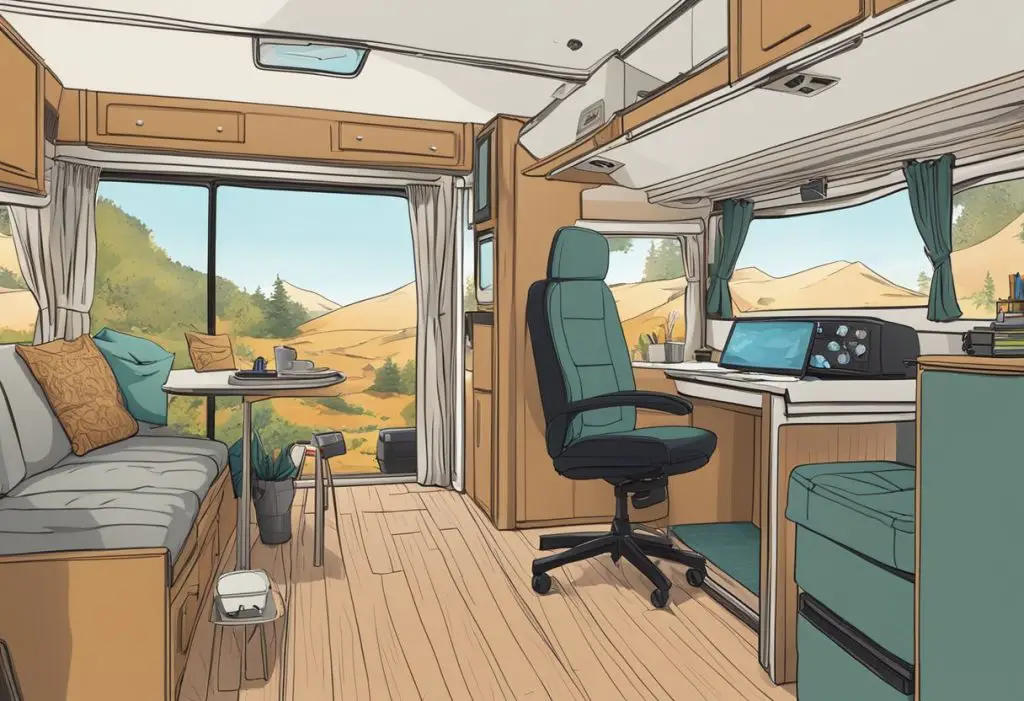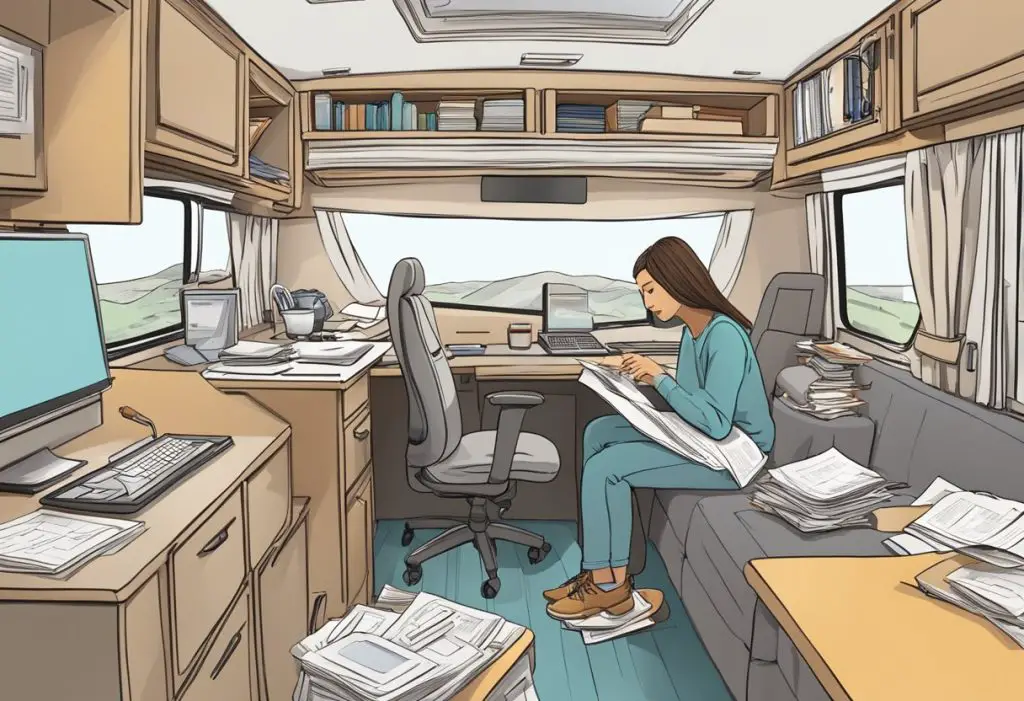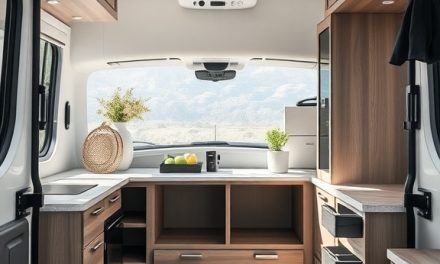Would you like to save this article?
Working remotely from an RV can seem like the ultimate dream for those craving freedom and adventure. Picture yourself working from picturesque spots, enjoying the flexibility to travel while earning a living. It can indeed offer a one-of-a-kind lifestyle.
However, this nomadic way of living isn’t without its challenges. While it sounds idyllic, there are various factors that can complicate what seems like the perfect work-life balance. Before diving into this remote working journey, it’s crucial to understand the possible downsides and prepare for them.
1) Limited Internet Access
Working remotely from an RV often presents challenges with internet access. Campgrounds and RV parks may offer Wi-Fi, but the speed and reliability can vary greatly. This inconsistency can disrupt important meetings and deadlines.
Mobile internet solutions, like cellular data, can also have limitations. Remote areas may lack strong signals, causing frequent connectivity issues. This can be frustrating, especially for those who rely heavily on stable internet.
Many RV workers need to invest in multiple internet options. Balancing cellular plans, satellite, and campground Wi-Fi can be complicated and costly. Despite these efforts, internet access remains a common hurdle in the RV lifestyle.
2) Frequent Maintenance Issues
Living and working from an RV often means dealing with ongoing maintenance tasks.
The vehicle itself requires regular check-ups, such as oil changes, tire inspections, and engine tune-ups. Additionally, the living quarters may need frequent repairs, like fixing leaks or dealing with electrical issues.
Environmental factors, such as extreme weather, can accelerate wear and tear. This constant upkeep can become time-consuming and costly.
3) Lack of Privacy
Living and working from an RV can often mean sharing close quarters with others. This can lead to a significant lack of privacy.
Noise levels in campgrounds and RV parks might disrupt video calls or focus time. Walls in an RV are thin, making it difficult to maintain quiet environments.
Anyone working remotely from an RV might also find it hard to separate work life from personal life. It’s challenging to create designated workspaces in such a small and multi-functional area.
4) Unreliable Power Sources
Living and working remotely from an RV often means grappling with unreliable power sources. Unlike the consistent electricity available in a traditional home or office, RVs rely on a mix of batteries, solar panels, and generators. Each of these has its limitations and can be affected by weather and usage patterns.
Batteries might run out of charge quicker than expected, especially if multiple devices are in use. Solar panels are dependent on the weather and can be less effective during cloudy or rainy days. Generators, while handy, can be noisy and need fuel, which isn’t always conveniently accessible.
These power challenges can interrupt work, cause stress, and necessitate backup solutions. It’s important to plan carefully and consider investing in high-quality equipment to mitigate these issues.
5) Noise Distractions
One of the biggest challenges of working remotely from an RV is dealing with noise distractions. Campgrounds and RV parks are often bustling with activity. Children playing, pets barking, and fellow campers setting up or taking down their sites can create a noisy environment.
Unexpected noise can make it difficult to concentrate. Even seemingly minor sounds, like the hum of an RV generator, can be disruptive. This can be frustrating, especially when trying to complete tasks that require deep focus.
Additionally, road noise is a common issue. RVs are often situated close to highways or busy roads. Traffic sounds can seep through the thin walls of an RV, making work calls or meetings challenging.
Morale can also be impacted by the lack of a quiet workspace. It’s not always possible to find a peaceful spot, which can add to the stress of maintaining productivity.
6) Small Living Space
One of the significant challenges of working remotely from an RV is the limited space. RVs are generally much smaller than traditional homes, so they pose some distinct difficulties.
In an RV, personal space is at a premium. Trying to balance work and life in such close quarters can be taxing. It can be hard to find a quiet area to focus, especially if you share the space with family.
Storage is another issue. With so little room, it’s tough to keep an organized work environment. Equipment, paperwork, and even daily essentials can quickly clutter the space, making work less efficient and more stressful.
7) Social Isolation
Working remotely from an RV can lead to feelings of social isolation. While the freedom of the open road is enticing, it often comes with limited interaction with friends and family.
This lifestyle can make it difficult to maintain strong social connections. Moving frequently means it’s challenging to build lasting relationships with neighbors and local communities.
Internet connectivity issues can also impact the ability to stay in touch through video calls or social media. This can enhance feelings of loneliness and detachment from loved ones.
Social activities and gatherings are harder to attend when traveling in an RV. Events, especially those requiring stable residence, can leave remote RV workers feeling left out.
8) Navigating Legal Restrictions
Working remotely from an RV presents unique legal challenges. Laws and regulations may vary significantly across states and jurisdictions. This means remote workers must stay updated on employment laws in each area they travel to.
Tax obligations can become complicated. Workers need to manage income tax filings for multiple states, depending on where they earn their income.
9) Minimal Work Space
Working remotely from an RV means adapting to a significantly smaller workspace than a traditional office.
Most RVs have limited square footage and multifunctional areas, making it challenging to find a dedicated spot for work.
Juggling between work materials, personal items, and the small space can quickly become overwhelming.
Setting up a home office in an RV demands creativity and organization.
Space for large monitors, printers, or extra office supplies may be nonexistent.
Additionally, sharing the RV with family members or pets can add to the clutter and distractions.
Maximizing efficiency in such a confined area requires constant effort and adaptability.
10) No Work-Life Separation
Working from an RV can blur the lines between work and personal life. It’s challenging to create a distinct boundary when your workspace is also your living space. This can lead to an unhealthy balance where work duties spill into personal time.
You may find it hard to switch off after work hours. The temptation to continue checking emails or complete additional tasks becomes stronger when there’s no clear division.
The lack of physical separation can make it difficult to relax and recharge, affecting both productivity and well-being.












